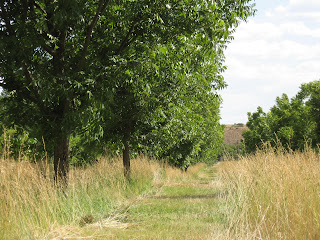
The Christmas Festival is a Northern Hemisphere designed thing. It is mid winter. The days are short and the nights long.

The harvests are in and the life cycle of summer growth is over. It is time to close the book on last summer and open the book for the coming summer. It makes sense to choose the "winter solstice" for a festival event and for the end of the year and the beginning of the next.
This decision was taken without consulting us poor southern hemisphere-ers.
It is mid summer here and blisteringly hot!! Last week the daytime temperatures were over +40C daytime and cooling to a night time minimum of +28C.
We have a crop this summer, but for which year??? It is cut in two.
I think we should have these events and festivals in July. Mid winter.
My Grandmother (English father and German mother) made a fuss of doing the house and verandah with Christmas decorations. The flower of the Mexican Aloe (picture) when dry was cut and put into a drum with stones to hold it upright. This went onto the verandah.
A branch of a Mimosa tree with the distinctive yellow pom-poms and white thorns decorated inside.
Cotton wool is then placed on it for the snow effect!!
The festival meal is also a must. And it MUST be in the traditional way. Hot dishes and meats of every description. Hot puddings with brandy sauce. A treat so large and special we continue picking off the remains for days!!
All in mid-summer!!!!!!!
So you northern hemispher-ers - think of us at the change of the year and our umbilical attachment to the festivals you invented!!
HAVE FUN + ALL THE VERY BEST GREETINGS AND WISHES FROM THE ROUX FAMILY. (Roux is French of course. We left Orange in Provence in 1688)
We will be swimming in the sea on New Years day. Sun-bathing, golfing, and a few cold beers or a glass of sauvignon blanc.
Sounds good to me!!










